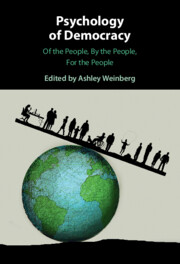Chapter 1 - Psychology of Democracy
Published online by Cambridge University Press: 24 February 2022
Summary
Democracy is under attack. Whether from those within its systems who seek to gain at the expense of others, or from without by rival forms of rule. Yet the crises we face as a species demand not only that we recognise the perils of a changing planet, but that we address them together. Democracy may imply an imperfect form of government, but its purported advantages lie in seeking to give voice to all people, political parties and perspectives, in hopes that the common good is served and citizens not only represented, but respected. The challenge of a pandemic, finding nations divided in their responses, underlines the pressing need for a genuine understanding of what democracy can and does deliver. This necessitates a clearer focus on our own roles as citizens – and thereby politicians in our daily lives – and on occupational politicians, as well as the political institutions and influences that shape our experiences of democracy. In opening ‘Psychology of Democracy: Of the people, by the people, for the people’, the editor points to the power of harnessing multidisciplinary and cutting-edge knowledge from psychology, political and allied social sciences. The opening chapter maps out the design and potential impact of the book, examining the psychology ‘of the people’ who are elected, the political institutions and processes created ‘by the people’ and the influences from broader societies that shape the context of democracy ‘for the people’. Its message is clear: the future is ours if we can better harness all human talents.
- Type
- Chapter
- Information
- Psychology of DemocracyOf the People, By the People, For the People, pp. 1 - 22Publisher: Cambridge University PressPrint publication year: 2022



